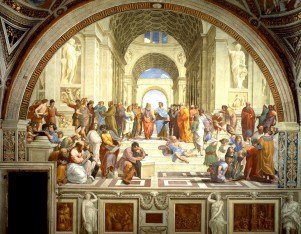Celebrating 2400 Years of Plato’s Academy
Article By Yaron Barzilay
 The year 2013 marks 2,400 years since Plato established his Academy in Athens. Founded in 387BC, the Academy has continuously influenced humanity since inception, be it the Mediterranean Civilizations, numerous western philosophers including the renaissance men (who referred to Plato as a divine philosopher,) to our modern world of today, in which Plato’s teachings still echo, as a call for awakening.
The year 2013 marks 2,400 years since Plato established his Academy in Athens. Founded in 387BC, the Academy has continuously influenced humanity since inception, be it the Mediterranean Civilizations, numerous western philosophers including the renaissance men (who referred to Plato as a divine philosopher,) to our modern world of today, in which Plato’s teachings still echo, as a call for awakening.
Just as democracy is still relevant to us today, though its origin lay in Ancient Athens, we might say the same for Plato’s ideas for the modern world; they have never ceased to be relevant, as these ideas investigate the fundamentals of human reality. Yet, it seems difficult to adequately appreciate Plato’s influence. On the one hand he is very familiar to us, but on the other, his ideas often seem to originate from an ancient world of initiatic knowledge that remains inaccessible, mysterious and enigmatic. There still remain unknown pages of Plato’s personal life with regards to the time he spent outside of Athens after the death of his teacher, Socrates. He is known to have travelled through Italy, where he met followers of Pythagoras who strongly influenced him with their knowledge. He might have also travelled to Egypt, where he is said to have been exposed to an ancient tradition of wisdom. In Timeos, Solon was told by an old Egyptian priest, perhaps reflecting Plato’s own belief, that the Greeks were like children who knew nothing of their past, and were completely unfamiliar with the antiquity of humanity. At his return to Athens at the age of 40, Plato established the Academy, his school of philosophy which, together with his writing, served as an immense expression of his ideas. He remained at this school till his death 40 years later, after which the Academy remained active in various different forms through the following nine centuries.
A School of Philosophy in the Classical Tradition
The methodology employed at the Academy was inspired by the Pythagorean model and the life of Socrates. It was based on the method of dialogue, intended to resolve issues of daily life and philosophical investigation. Among other faculties, students were trained in Mathematics, Geometry and Music. It is said that on the very Gates of the Academy, was written “Let None, But Geometers, Enter Here.” The word “Geometers” here, refers to a deep understanding of the numerical archetypes (expressed in geometrical forms), as in the Pythagorean tradition, that goes much beyond a mechanical engineering capability. Active dialogue between teacher and disciple facilitated a profound search for truth, in light of the Socratic Method, or the Maieutics, the birth of truth, highlighting the inspirational idea that within the mind of each individual Truth already exists, and only needs to be unveiled. “We do not learn, and what we call learning is only a process of recollection”, says Plato.
Dialogue among fellow disciples also ensured a real freedom of thought in The Academy. It is noteworthy that women too were accepted within the school and it is said that Plato never accepted fees for teaching, unlike many other teachers of his time. Perhaps this suggests that the Academy was not an ordinary school as understood today, but may have been a unique community of philosophers who practiced philosophy as a way of life. Plato encouraged his disciples to become active members of the community, rather than live isolated, and we find several followers had taken on proactive roles in their cities. In order to reform society, and guide others in a just way, it is not enough to gain mere theoretical knowledge. Nor is it enough to have an experience or influence. One also needs to mould himself and become a better human being.
Plato spoke of human evolution as consisting of 4 essential steps in the transformation towards an awareness of a divine state. He shared the belief in the universal idea of reincarnation, through which human beings evolved through four stages of consciousness; these are spoken of in terms of Men of Iron, Men of Copper, Men of Silver and Men of Gold. Men of Gold refers to the highest state of human evolution and may reassemble the ancient Indian concept of the Brahmin, the ‘twice born’; he who gains a divine awareness of himself and of his surroundings. This state is repeatedly described as the aim of human evolution amongst various initiatic civilizations who speak of the human possibility to discover a higher form of reality. In contrast, Men of Silver, who shine in the colour of the moon, are described as having an innate need to follow the truth, but do not yet possess it; they are the warriors who must transform themselves from within, in order to become what they are seeking. They are said to have the ability to guide others, as long as they remain aligned to wisdom. Unlike gold, they need to constantly work on themselves, polish themselves, lest they get covered by shadows. These Men of Silver are the philosophers, and are the main concern of Plato at his Academy, as they play a key role in preserving Wisdom and Justice among men, and are able to transform society. Like Confucius, who lived only a short time earlier, Plato believes that the key lies with philosophers, guiding the state in order to create a just society.
The Allegory of the Cave
In order to help us understand the gravity of the illusions we fall prey to, Plato shares with us an allegory to express our mistaken perception of the world of senses as a credible reality. He describes men who are chained since birth inside an underground cave, seated facing the inner walls. Behind them is another wall that conceals a fire that functions like a sun. Other men, known as masters of the cave, move along this wall with objects in their hands, creating shadows on the cave’s inner walls. The prisoners, ignorant to the fact that they are in fact slaves, mistake these shadows for truth. How horrible is the slavery of one who doesn’t even know he is a slave?
It may transpire that due to his true nature, one of the prisoners will feel uncomfortable with this world of ‘Maya’ and will fight his way out. Slowly he will turn his attention to exiting the cave, and will have to get accustomed to the light of truth, the true light of The Sun. This describes the philosopher, whose love and yearning for wisdom, place him on the path to a reality beyond the sensible world; one who opens the door to an inner life and eternity. Understanding the gravity of the illusion of his fellow human beings still inside the cave, he may return into the cave once again, to share the knowledge of truth with the others. This act of service, according to Plato, makes him the real politician, one that brings ethics to the state, the Polis. This is described as the noblest task a man can take on himself, the selfless caring for his brothers, knowing that he may suffer for sharing the truth with those who may wish it not, like doctors who occasionally administer unpleasant medicine. In the cave, there are also those who make sure the chained men remain ignorant – the masters of the cave, who personally gaining from the slavery of men, and therefore discourage men from learning of their true potential and fight against any such liberator. In the poetic words of Plato: “We can easily forgive a child who is afraid of the dark; the real tragedy of life is when men are afraid of the light.”
How relevant is this allegory to us? How can we benefit by following Plato’s advice? After 2,400 years, has the illusion of men reduced, in light of modern technology and common knowledge? Or has the veil of the senses strengthened, become thicker with the ‘digitalization’ of our life, resulting in a cyber reality in which we are faced with the ever growing demands of the senses responding to a fast moving world? Do we see the cave at all today? Can we identify the modern ‘masters of the cave’ who deliberately keep man ignorant of The Truth?
Even today, the remedy seems to be the same; it starts with philosophy, the love for Truth and Wisdom. Plato himself suggests, “Philosophy begins in wonder.” Hence let us stop for a second while running our daily race, and ask ourselves if we live life with wonder. Or do we wait, passively, for someone else to take our hand and pull us up?
The 2,400th anniversary of Plato’s Academy is an opportunity to celebrate the importance of philosophy for the pursuit of the liberation of mankind. Not necessarily modern philosophy as spoken of in academic circles, which seems trapped in the intellectual realm of investigation. Instead, schools of philosophy in the classical manner, offered Philosophy as an applicable way of life, a path of knowing and changing ourselves. True learning demands a change in ourselves, known as walking the path.
———
Author:
Yaron Barzilay is the Managing Director of New Acropolis Cultural Organization in India.
This article was publish in “The Speaking Tree”, The Times of India, on 16th November, 2013
Image Credits: By Ttaylor | Wikimedia Commons | CC BY PD, By Wikimedia Commons | CC BY PD
The entity posting this article assumes the responsibility that images used in this article have the requisite permissionsImage References
By Ttaylor | Wikimedia Commons | CC BY PD
Read the original article on http://acropolis.org.in/mumbai/articles/226-celebrating-2400-years-of-platos-academy
Permissions required for the publishing of this article have been obtained



